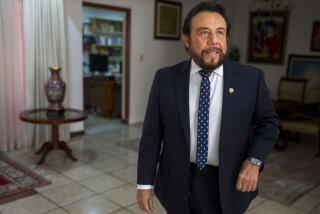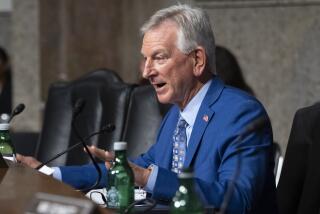Salvador Leader to Retain 2 Controversial Generals
- Share via
USULUTAN, El Salvador — Conceding that he needs more time to purge this nation’s powerful armed forces of human rights abusers, Salvadoran President Alfredo Cristiani announced Wednesday that he plans to retain two of his most controversial officers in top government posts.
Cristiani confirmed that he has asked the United Nations to allow him to dismiss senior officers gradually on a timetable that sources say could last until the end of his presidency next year. The officers were to be removed from duty because of human rights violations and other crimes.
Cristiani’s comments were his first public admission that he cannot or will not purge the military of more than 100 of its most abusive officers by deadlines set out in U.N.-brokered peace accords that ended 12 years of civil war.
“We believe everything should be accomplished within a transition period,” the president told reporters after a military ceremony in Usulutan, a city 65 miles southeast of the capital.
The purge was to be completed by Dec. 31. But Cristiani has sought delays to minimize unrest in the armed forces. The purge is a central element in the accords and is seen as a crucial test of whether the military that has long dominated Salvadoran society can be brought under civilian control.
In response to a question, Cristiani announced that Defense Minister Gen. Rene Emilio Ponce and his deputy, Gen. Juan Orlando Zepeda, will remain in their posts for now. The generals, among this nation’s most powerful men, head the list of officers who were to be purged. Both were implicated by a U.S. congressional panel in the cover-up of the 1989 murder of six Jesuit priests by an army platoon.
“For the moment, there is no plan to remove or change the defense minister or the vice minister of defense,” Cristiani said.
Reports that Cristiani would spare certain officers from the purge have angered many in the opposition, who charge that the president is violating the accords. But the leftist former guerrillas who fought the government for more than a decade have chosen not to fight Cristiani over this.
Riven by internal disputes over the purge, the former guerrillas instead urged the United Nations to guarantee that the cleansing of the army be conducted “in the briefest time possible.”
“A first step in the right direction has been taken,” former rebel commander Shafik Handal said. “But it is still insufficient.” Joaquin Villalobos, another of the former rebels’ leaders, said: “We understand that you cannot humiliate the armed forces.”
Under the accords, a three-member civilian commission was established to review the records of the Salvadoran army’s officers’ corps and recommend dismissals or transfers to non-command posts. Cristiani was bound to carry out the recommendations by Dec. 31.
According to diplomatic and rebel sources familiar with the commission’s work, 76 officers were to be fired and 27 were to be transferred. Of the 76 who were to lose their jobs, Cristiani is said to have dismissed 23; another 38 were relieved of commands but not cashiered. Seven more were reportedly assigned to overseas posts.
A final core group of eight senior officers, including Ponce and Zepeda, are said to be staying in their posts, possibly throughout the remainder of Cristiani’s term in office. He steps down from the presidency in June, 1994.
More to Read
Sign up for Essential California
The most important California stories and recommendations in your inbox every morning.
You may occasionally receive promotional content from the Los Angeles Times.














